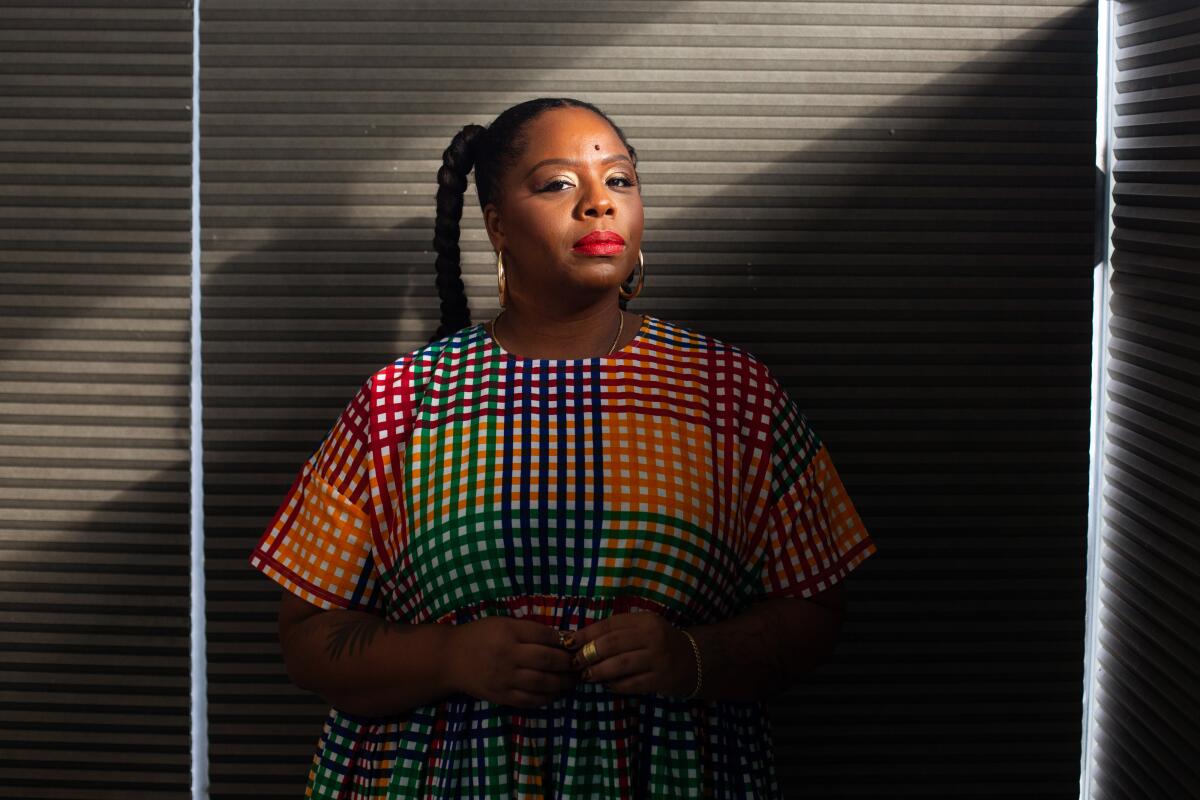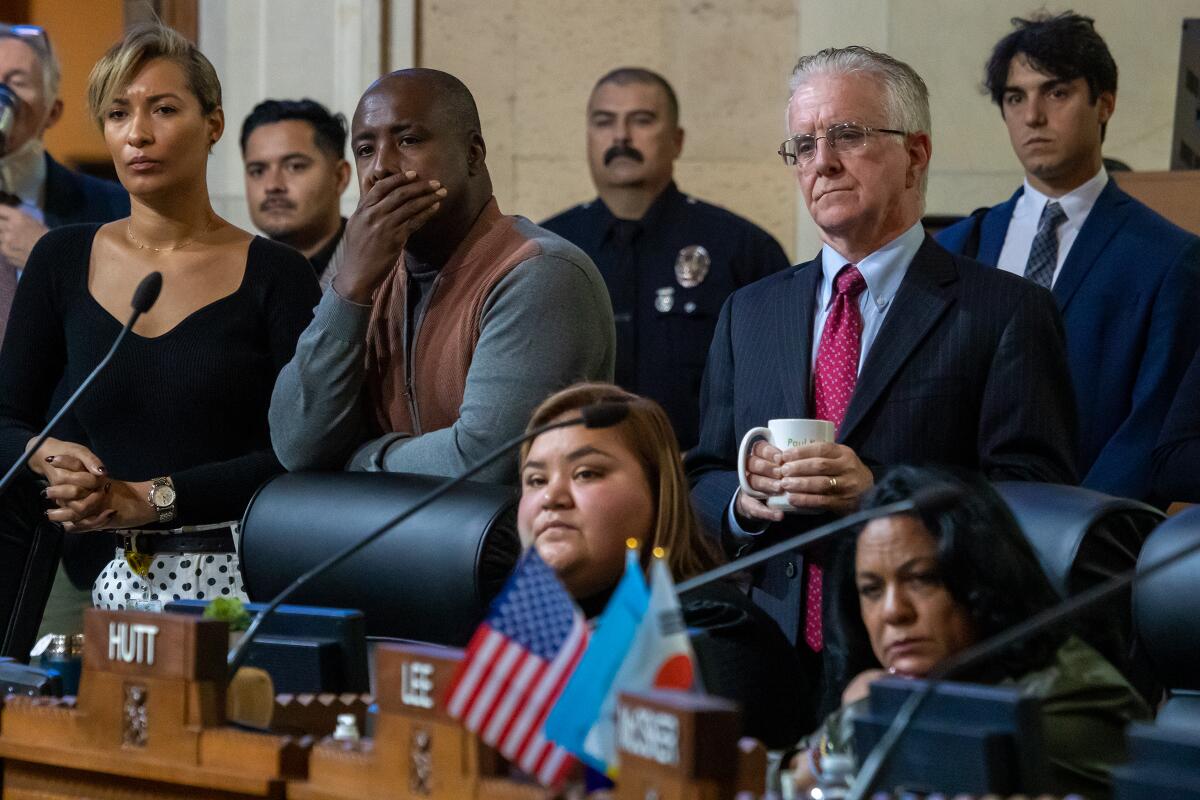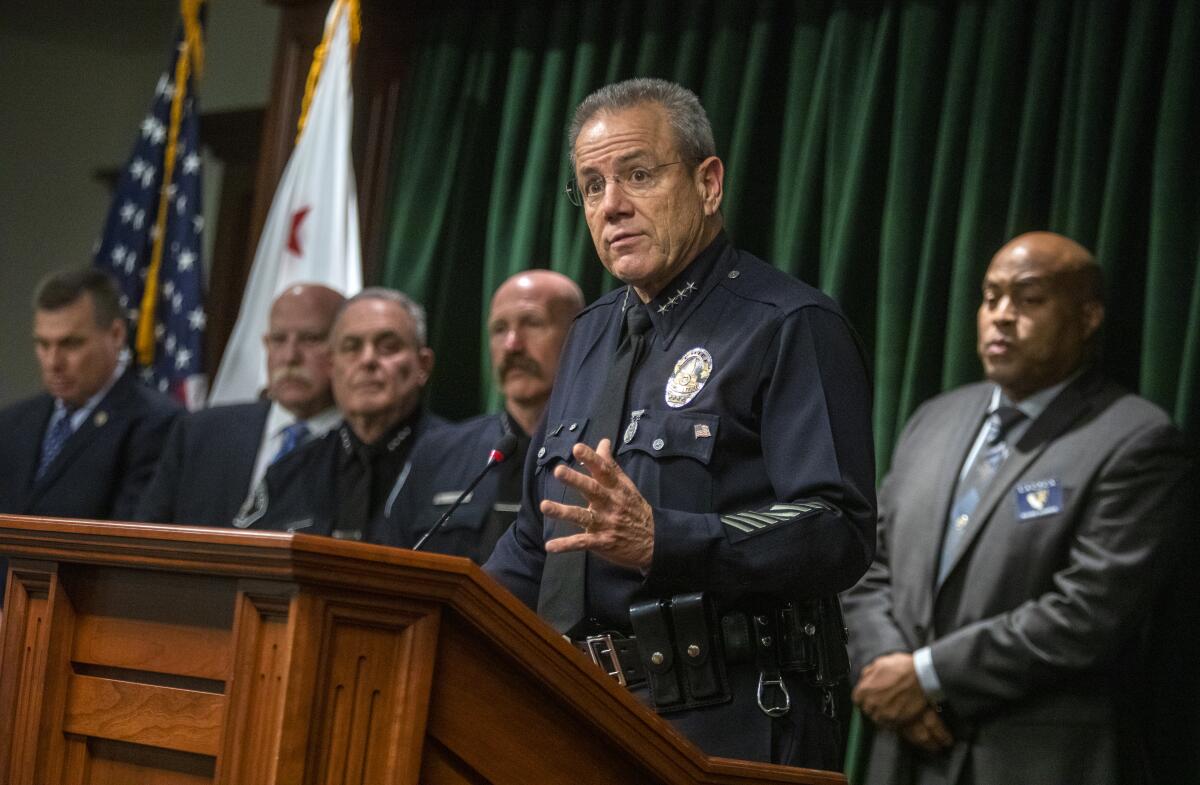For Patrisse Cullors, co-founder of Black Lives Matter, police violence hits close to home

- Share via
Patrisse Cullors is used to being the one consoling families of people who died at the hands of police, not the other way around.
But there she was, fielding voicemails, DMs and WhatsApp messages from well-wishers as she grappled with the sudden loss of Keenan Anderson, a distant cousin who died earlier this month after a Los Angeles police traffic stop.

Cullors, a co-founder of the Black Lives Matter Global Network, said she knew what it was like to share in the trauma and grief of others who’d had loved ones killed by law enforcement. But the pain of losing someone so close to her hits differently, she says.
“People are shocked. I’m shocked, and I helped start a movement to help hold police accountable,” said Cullors, who left the organization she helped start in 2021, after it had become synonymous with a worldwide movement against racial injustice. “Even though you’ve hashtagged, and you’ve protested, and you’ve called for police accountability and you’ve had conversations with your family about it, but it’s very different when it lands at your doorstep.”
Anderson, a father of one who taught high school English, had been in town visiting from his home in Virginia. His death was the latest of three in LAPD custody so far this year.
The department released body-camera video Wednesday from all three incidents: the police shootings of Takar Smith and Oscar Sanchez, and Anderson’s death, which came hours after he was tased during an arrest in Venice. Anderson’s relation to Cullors drew attention to the case from far-flung publications such as the New York Times and the Guardian in London. And it provoked a swift backlash on social media, where it inspired the hashtag, #nocopsattrafficstops.
Two City Council members have joined growing calls to fire the officers involved in all three incidents. After the videos were released, Mayor Karen Bass issued a statement saying she had “grave concerns about the deeply disturbing tapes” and that she believed the officers involved should be placed on leave.

The deaths of Anderson and the others come at a politically sensitive moment for both Bass, who campaigned on the promise of reducing police violence, and Chief Michel Moore, as he seeks reappointment to a second term.
Moore briefly addressed the incidents at a meeting of the Police Commission on Tuesday. He said he’d decided to release the videos for the sake of “transparency.”
Later during the meeting, several callers cited the incidents as evidence of the department’s failures and a reason not to reappoint Moore, who is seeking a second five-year term. He has said that he would likely only serve two or three years if reappointed, stepping aside to make way for the next chief in time for the 2028 Olympic Games.

Moore has defended his record and rejected the characterization of his department by some critics as being the most “murderous” in the country, saying the number of deadly encounters is down from years past and the department has benefited from various new policies and training.
The commission met in closed session Tuesday to discuss Moore’s future, but a previously announced vote on the matter has been delayed.
The footage has also caught the eye of lawmakers in Sacramento.
Assemblymember Kevin McCarty (D-Sacramento) plans to introduce a bill this year that would significantly expand a state law requiring the state inspector general’s office to independently probe all fatal police shootings of unarmed civilians to determine whether criminal charges should be filed against the officers involved. Under the proposed new bill, the law would cover all killings by police. Incidents such as Anderson’s death are among the reasons McCarty decided to work on the bill this year, he said.
The legislation would “cover all fatalities at the hands of law enforcement, whether or not the individual was armed,” he said. “The priority with my bill is accountability when officers potentially do cross the line.”
Currently, state law — Assembly Bill 1506 — limits investigations only to deadly police shootings and exclude “the use of electronic control devices, stun guns, BB, pellet, air, gas-powered guns, or weapons that discharge rubber bullets or beanbags,” according to the state Department of Justice.
A preliminary toxicology report by the Los Angeles Police Department determined that Anderson had cocaine and cannabis in his system. The results of a more complete autopsy conducted by the Los Angeles County medical examiner’s office may not be made public for weeks, if not months. No cause of death has been disclosed.
But Cullors said the family plans to commission an independent autopsy — paid for by a program founded by former NFL quarterback and civil rights activist Colin Kaepernick — after learning that the county medical examiner’s office could take several months to release its findings. Even if the results come out sooner, Cullors said she worries they could be colored by bias and be used to create a pro-police narrative that would blame Anderson for his own death.
She said she had spent hours since his death on FaceTime with relatives, keeping up with the financial and legal minutiae of burying a loved one. After having had so many of these talks with others over the years, Cullors said she thought she would know what to do and say.
“And then I just break down in tears talking about, ‘I can’t believe I’m doing this for my own family, I’m so used to doing this for other families,’” she said in an interview with The Times. “It feels really scary, it feels really frightening, it feels disturbing and all I can do is just do the work that I’ve been doing for the last decade.”
After his mother died when he was 10 following a long struggle with substance abuse, Anderson moved in with his distant uncle, Michael Brignac, 59.
Even as the family knew his faults, they chose to remember positive memories about Anderson. Since his mom’s death, his uncle said, Anderson always seemed to have something to prove.
There was the time growing up that Anderson was learning to ride a motorcycle, Brignac said. Eager to prove his fearlessness after only a few test rides, he suddenly took off on the bike and began “riding around with no hands and hollering, ‘Uncle Mike, I told you I could ride better than you!’”
Even as an adult, Anderson never lacked for confidence, strutting into a family cookout one year “like he was the movie star,” his uncle recalled. “He always was kind of like the life of the party and everybody ran over and hugged him,” Brignac said. “He changed the mood of the picnic.”
He was also a doting father to his 5-year-old son, Brignac said.
In a cruel twist of irony, Brignac recalled that his nephew at one time was intent on a career in law enforcement because he wanted to help people. He went as far as to double major in criminal justice and sociology at New Mexico Highland University, where he was also on the football team. He was on a partial football scholarship but also paid for some of his schooling through a combination of work-study jobs and working at his uncle’s Creole and Cajun restaurant over the summers, Brignac said.
After going from job to job for years, Anderson decided to go into teaching and graduated with a master’s degree in education, leadership and change from Antioch University in 2022.
Then about six months ago, he moved to Virginia with his fiancé, taking a job as a 10th-grade English teacher at a high school in Southeast Washington, D.C., his family said.
He was back in Los Angeles to pick up belongings he had left behind during his somewhat abrupt move east. His relatives said they didn’t want to speculate about what led up to his fatal encounter with police, saying they hoped the police video would shed some light on what went wrong — and whether it could have been prevented.
Even before the footage was released, Cullors said she worried about how Anderson’s sudden death is affecting others who knew him, including his former students.
“I can only imagine what all those babies are thinking,” she said. “They were literally 5 years old when Black Lives Matter was started, and then their own teacher was killed.”
Times staff writer Hannah Wiley contributed to this report.
More to Read
Sign up for Essential California
The most important California stories and recommendations in your inbox every morning.
You may occasionally receive promotional content from the Los Angeles Times.











